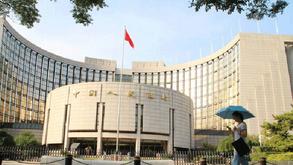 The headquarters of the People's Bank of China in Beijing. (SHI YAN / CHINA DAILY)
The headquarters of the People's Bank of China in Beijing. (SHI YAN / CHINA DAILY)
BEIJING - China will maintain a “normal” monetary policy, a senior central bank official said on Tuesday, as Beijing holds off on more easing as its post-COVID economic recovery gathered pace.
Sun Guofeng, head of the monetary policy department at the People’s Bank of China, told a press conference the central bank would not change its monetary policy direction or its flexible approach to policy
Sun Guofeng, head of the monetary policy department at the People’s Bank of China (PBOC), told a press conference the central bank would not change its monetary policy direction or its flexible approach to policy.
Liquidity would also stay reasonably ample, which would allow China’s economy to return to its potential growth, he said.
ALSO READ: China's stocks rally near 2-year high on PBOC easing signal
“To cope with all sorts of uncertainties, the monetary policy requires greater certainty,” said Sun, adding that China has not adopted zero or negative interest rates and other non-traditional policies such as quantitative easing. That means the PBOC does not need to deal with the complications associated with exiting such measures.
Chinese authorities have urged banks to offer cheaper loans and cut fees to help struggling businesses hit by the COVID-19 pandemic. Lenders have also grappled with a surge in non-performing loans and difficulties to replenish their capital as profits fell.
ALSO READ: China's central bank injects liquidity into market
Despite the pressures on the banking sector, there is no need for China to lower regulatory requirement on banks’ capital adequacy ratio, Liu Guoqiang, vice governor at PBOC, told the same briefing.
Capital adequacy ratio of the banking sector fell to 14.21 percent by end-June, but still remained above the regulatory standards of 10.5 percent, according to Liu.
“Even as capital adequacy ratio drops further in the future, we cannot lower regulatory requirements. Doing so would be fooling ourselves,” said Liu, adding that banks should rather replenish their capital via tools such as perpetual bonds and second-tier capital.
Mid-sized and small banks can use proceeds from local government special bonds to boost their capital, Liu said.
READ MORE: As liquidity concerns abate, financial stability in focus
On China’s official digital currency, Sun from PBOC said internal tests are being conducted in Shenzhen, Suzhou, Xiongan and Chengdu, with plans for use at the 2022 Winter Olympic Games in Beijing although there was no timetable for the rollout.


